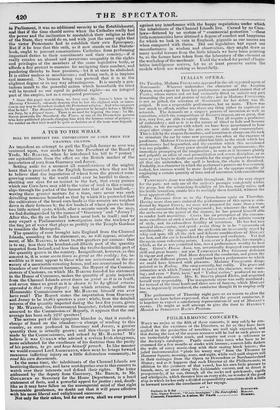ITALIAN OPERA.
ON Tuesday, Madame FINCELOIllt appeared in the oft-repeated opera of S'enairantide. Whoever undertakes the character of the Assyrian Queen, must expect to have her performance measured against that of PasTA, whom nature and art had eminently fitted to sustain any part demanding the port and gesture of royalty ; and as Madame FrNCELOHIC, is not so gifted, the selection of Semiramide for her debut was ill- judged. It was a respectable performance, but no more. There was not much to offend, neither was there any thing either to captivate or astonish. The demands on a singer's powers of invention us well as execution, which the compositions of ROSSINI impose, are so great, that few, very few, are able to satisfy them. They all require a profusion of embroidery ; and as it is in the nature of tinsel to fade and become shabby, so the passages with which we have been accustomed to hear singer after singer overlay his airs, are now stale and commonplace. This is felt by the singers themselves, and invention is always on the rack to stimulate the ear by some new passage, too often at the expense of good taste. Madame FINCELOHR added but little to the stock which her predecessors had bequeathed, and the exertion which this occasioned was too palpable. Every grace should appear to be spontaneous—Abe immediate prompting of the imagination ; as soon as it becomes plainly and palpably an affair of cool premeditation and severe discipline, or as soon as you begin to doubt and tremble for the singer's power to achieve all that she undertakes, the spell is broken, the charm is dissolved. Probably, in a character in which the performer's powers are less severely tasked, her success would be more decided, as she appears capable of employing a certain quantity of tone and of execution with considerable effect.
TAMBURINI'S Assur was admirable throughout. He is the very singer for the part: not only are all the author's passages completely %vithin his grasp, but the astonishing flexibility of his line, manly voice, and his fertile invention, enable him to multiply them fourfold, without the least apparent effort. Don Giovanni drew us to the Opera-house again on Thursday. Having more than once endured the performance of this opera as con- ducted by Signor COSTA, we were not prepared for more than a tran- sient and occasional feeling of enjoyment ; for, whatever the talent of the orchestra or the power of the singers, lie has proved himself able to render both unavailing. COSTA has no perception of the consum- mate excellence of such a work as Don Giovanni—of its infinite variety of style, and its exhaustless fertility of invention. Ile has but two musical ideas—noise, and speed : every thing is to be " crescendo ed accellerando ;" the singers and the orchestra are incessantly urged by whip and spur, till all the rich and delicate combinations Of Mozaur are lost, and the ear is bewildered by clamour and confusion. Yet had the opera some redeeming points. LABLACHE'S Leporello, for example; which, as far as was permitted him, was a performance worthy its best days. ORISI'S Donna Anna, too, occasionally displayed consummate skill and great beauty : nor was TAMBURINI.S Don Giovanni deficient in vigour and grace. Had Moat deposed the conductor, and given the time of the different pieces, it would have been a performance to which we could have listened with pleasure. Madame FINCELOHR disap- pointed us in Zer/ina. She sung correctly, but coldly. The grace and animation with which Fonoa used to invest the character, were want- big; and even " Batti, batti," and " Vedrai carino," produced no sen- sation on the audience. Mrs. E. SEGUIN played Elvira, and acquitted herself very respectably. The masquerade scene was sadly mutilated ; for instead of the three bands and three sets of dancers which MOZART has so ingeniously introduced, the conductor thought et to employ only one.
The performance of Thursday night gave us no reason to alter the opinion we have before expressed, that with the present conductor, it is hopeless to expect a satisfactory representation of any of Moznar's operas. He might as well attempt to give the time to HANDEL'S Messiah or SEBASTIAN BACH'S Passione.






















 Previous page
Previous page